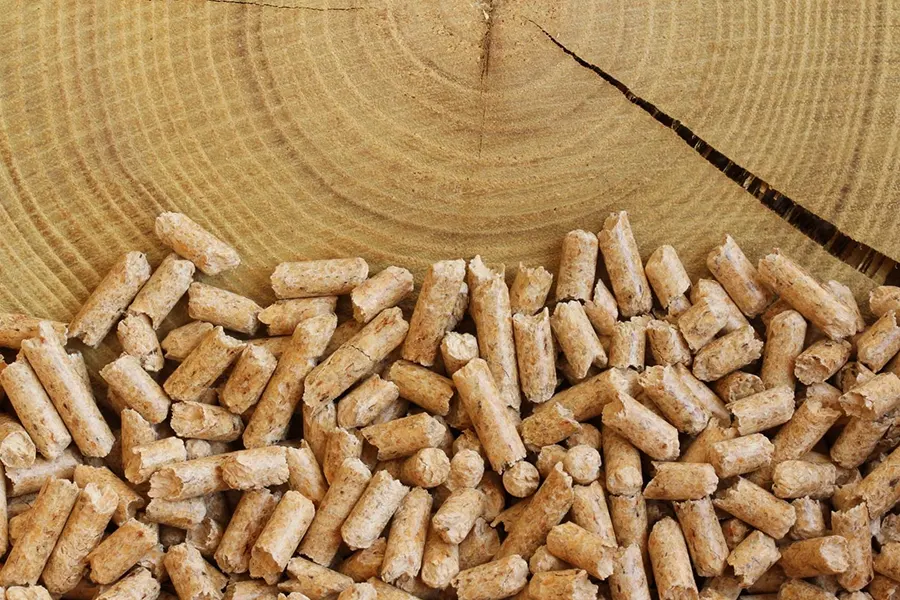Wood Pellets: Eco-Friendly Fuel and Their Benefits for Nature

In today's world, the question of sustainable and eco-friendly energy sources is increasingly arising. Among many solutions, wood pellets, also known as pellets or biofuel pellets, attract special attention. This fuel, made from woodworking waste, has become an excellent alternative to traditional energy sources such as coal and natural gas.
What Are Wood Pellets?
Wood pellets are fuel granules made from sawdust, wood shavings, wood waste, and sometimes agricultural residues. Due to their high density and low moisture content, wood pellets have excellent calorific value and can be used for both residential heating and industrial purposes.
The production process of wood pellets involves compressing shredded wood material under high pressure without adding chemicals. The wood mass is naturally bonded due to the presence of lignin in the wood. This technology ensures the high eco-friendliness of the product and the absence of harmful substances, making pellets safe for the environment and humans.
Environmental Benefits of Wood Pellets
One of the key advantages of wood pellets as fuel is their eco-friendliness. Unlike fossil energy sources such as coal or oil, wood pellets have almost no impact on the carbon balance in the atmosphere. Here's why:
- Carbon Neutrality. During the combustion of wood pellets, the same amount of carbon dioxide is released as was absorbed by the trees during their growth. This makes pellets a carbon-neutral fuel, significantly reducing greenhouse gas emissions and helping to mitigate negative climate impacts.
- Waste Utilization. The production of wood pellets uses waste from the forestry and woodworking industries, such as sawdust, offcuts, and shavings. Thus, pellets help efficiently recycle waste and reduce the volume of waste that would otherwise end up in landfills or be incinerated, polluting the atmosphere.
- No Harmful Additives. Unlike coal and other traditional fuels, no chemical additives are used in the production of wood pellets. This makes them safe for the environment and minimizes harmful emissions during combustion.
Benefits for Nature and Sustainability
Wood pellets not only have advantages in terms of carbon neutrality but also contribute to sustainable forest management. Many companies producing biofuel pellets use only certified wood obtained through environmentally responsible logging. This approach helps maintain biodiversity and prevents forest ecosystem degradation.
Moreover, using wood pellets as fuel reduces dependence on fossil energy sources, decreasing coal and oil extraction, which has a destructive impact on natural ecosystems. Instead, a renewable and sustainable resource—wood—becomes the main source of heat energy for many homes and businesses.
Wood Pellets as an Affordable Fuel
From an economic perspective, wood pellets are a very cost-effective fuel option. They have high energy efficiency, providing more heat for less money. Furthermore, buying wood pellets often costs less than traditional fuels, especially in regions with a developed forestry industry.
When choosing wood pellets for heating, it is important to consider parameters such as pellet quality, calorific value, and moisture content. High-quality pellets are characterized by a homogeneous structure, low ash content, and high calorific value. For long-term storage, it is recommended to choose pellets with minimal moisture content to retain their calorific properties.
Where to Buy Wood Pellets and How to Choose the Best Price?
In recent years, interest in using pellets for heating has grown significantly, leading to the emergence of many offers on the market. You can buy wood pellets directly from manufacturers or through specialized stores or online platforms. The price of wood pellets can vary depending on factors such as raw material quality, seasonality, and batch size.
Some of the criteria to consider when choosing wood pellets:
- Raw Material Quality. Pellets made from clean wood waste are usually more expensive, but they have better thermal properties.
- Pellet Grade. There are several grades of wood pellets, such as ENplus A1, A2, and B. Pellets of grade A1 are the highest quality and suitable for domestic use, while grades A2 and B are often used for industrial purposes.
- Location and Delivery. The price of wood pellets may also depend on the distance of the buyer from the manufacturer or warehouse. When buying in bulk, many suppliers offer more favorable terms.
When buying wood pellets, it is important to pay attention to product certification, as it guarantees compliance with quality standards. Certified pellets provide efficient combustion and minimal emissions, making them ideal for environmentally conscious consumers.
Pellet Boilers and Heating Efficiency
Using wood pellets requires special equipment, such as pellet boilers or pellet stoves. These devices are specifically designed for using biofuel pellets and provide the most efficient combustion. Pellet boilers have high efficiency, which helps minimize heat loss and reduce heating costs.
Pellet heating systems also have several advantages over traditional wood-burning stoves. They automatically regulate pellet feed into the burner, ensuring stable indoor temperatures and eliminating the need for constant monitoring. Additionally, modern pellet boilers are equipped with automatic cleaning systems, making them convenient and easy to use.
Wood Pellets as Environmentally Friendly Fuel of the Future
Wood pellets are an excellent alternative to fossil fuels due to their eco-friendliness, availability, and high energy efficiency. They help reduce greenhouse gas emissions, efficiently recycle waste, and support sustainable forest management. Using wood pellets helps make heating homes and businesses not only more economical but also environmentally friendly, which is especially important in the context of climate change and increasing energy demands.
If you want to contribute to environmental conservation while reducing your heating costs, wood pellets are a great choice. You can buy wood pellets from trusted suppliers, choosing products with appropriate certification and good calorific properties. The price of wood pellets depends on quality and volume, but in the long term, this fuel will certainly pay off, making your home warm and environmentally friendly.
